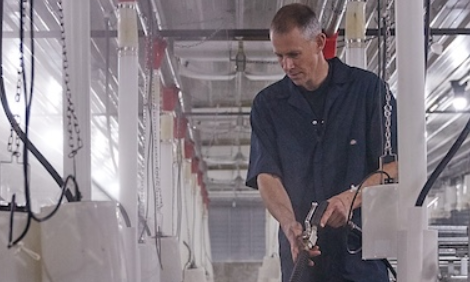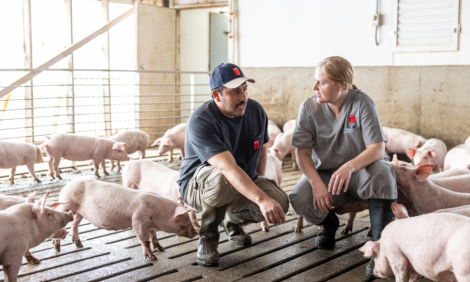



Effects of a Lactobacillus Product on Pig Growth and Pork Quality
Lactobacillus plantarum ZJ316 is reported to improve pig performance and pork quality by researchers based in Hangzhou, China. They suggest that the mode of action may be the inhibition of growth by opportunistic pathogens and the promotion of increased villus height.Lactobacillus plantarum is a plant-associated bacterial species but it has also been found in human, mouse and porcine gastrointestinal tracts. According to Cheng Suo from Zhejiang Gongshang University in Hangzhou and co-authors there and at Zhejiang Academy of Agricultural Sciences in BMC Veterinary Research, this species can ferment a broad spectrum of plant carbohydrates, is tolerant of bile salts and low pH and it has antagonistic potential against intestinal pathogens. However, experiments reporting the use of L. plantarum as a probiotic are limited, they say, so in their study, the effects of L. plantarum ZJ316 isolated from infant faecal samples on pig growth and pork quality were investigated.
A total of 150 newly weaned pigs were selected randomly and divided into five groups. Group 1 was fed a diet supplemented with the antibiotic mequindox; Groups 2, 3 and 4 were fed a diet supplemented with L. plantarum and no antibiotic; and Group 5 was fed a mixture of mequindox and L. plantarum. After a 60-day initial treatment, samples were collected for evaluation.
The results showed that, the L. plantarum ZJ316 has probiotic effects on pig growth and that these effects are dose-dependent. The effects of a dose of 1 × 109 colony-forming units (CFU) per day were more pronounced than those of a dose of 5 × 109 CFU per day or 1 × 1010 CFU per day. In Group 2 (1 × 109 CFU per day), the diarrhoea (p=0.000) and mortality rates (p=0.448) were lower than in antibiotic-treated pigs (Group 1), and the daily weight gain (p=0.001) and feed conversion ratios were better (p=0.005).
Improved pork quality was associated with Lactobacillus treatment. pH (at 45 minutes; p=0.020), hardness (p=0.000), stickiness (p=0.044), chewiness (p=0.000), gumminess (p=0.000) and restoring force (p=0.004) were all significantly improved in Lactobacillus-treated pigs (Group 2).
Although L. plantarum was found to exert probiotic effects on pig growth and pork quality but the researchers comment that the mechanisms underlying its action require further study.
Polymerase chain reaction-denaturing gradient gel electrophoresis results showed that the gut bacterial communities in Lactobacillus- and antibiotic-treated pigs were very similar and the quantity of L. plantarum ZJ316 was below the detection limits of DGGE-band sequencing. The concentration of short-chain fatty acids in Lactobacillus- and antibiotic-treated faecal samples were not significantly different (p=0.086). However, villus height in the ileum (p=0.003), jejunum (p=0.000) and duodenum (p=0.036) were found to be significantly improved by Lactobacillus treatment.
L. plantarum ZJ316 was found to have probiotic effects, improving pig growth and pork quality, concluded Suo and co-authors. The probiotic mechanism might not involve L. plantarum colonisation and alteration of the gut bacterial community, they add, but rather, it might be related to the inhibition of the growth of opportunistic pathogens and promotion of increased villus height.
Reference
Suo C., Y. Yin, X. Wang, X. Lou, D. Song, X. Wang and Q. Gu. 2012. Effects of Lactobacillus plantarum ZJ316 on pig growth and pork quality. BMC Veterinary Research, 8:89. doi:10.1186/1746-6148-8-89
Further ReadingYou can view the full report (as a provisional PDF) by clicking here. |
September 2012






